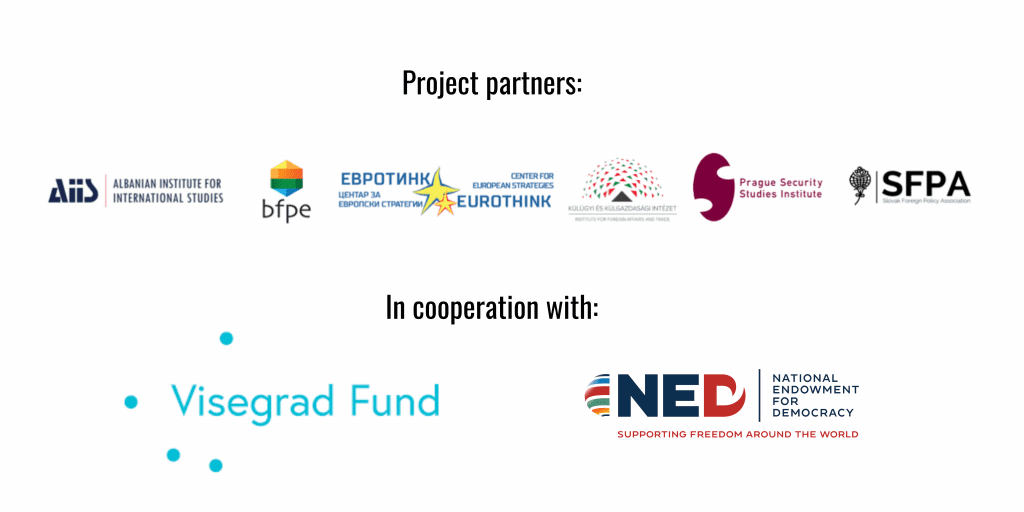
4 March 2022
There is an overall democratic decline both in the Western Balkans and in the EU. With the EU entangled in its own problems, much fewer efforts, energy and funds are invested from Brussels in order to aid the democratisation of the Western Balkans. The disputes between the establishment in Brussels and leaders of Central European countries (most notably Hungary and Poland) increase and the EU becomes more disunited.
In this light, the enlargement policy becomes less lenient: despite the fact that the doors to EU membership are not completely closed, the very fact that requirements for rule of law, economic freedom, and overall protection of human rights are much stricter makes it practically impossible for some of the WB states to finalize negotiations. This ‘unofficial’ enlargement fatigue at the EU produces open fatigue on the side of Western Balkans; the elites invest fewer efforts to adhere to Copenhagen criteria. Some of the WB countries, such as Serbia and North Macedonia, leave the accession process altogether.
This democratic decline worsens some of the already problematic benchmarks in WB societies. There is a continued development of informal structures overlapping business and politics. Thus, the troublesome media sector becomes more dominated by states themselves, with oligarchs loyal to political leaders (and vice versa) shrinking the space for free and objective journalist activity. With the decreased interest in joining the EU, the role of international illiberal actors such as China, Russia, Turkey and the Gulf States increases, both politically and economically. In terms of economy, these trends draw the region even farther from the EU, making the economic convergence between the two less possible.
Additional Variables
Four additional global factors (and highly probable ones) can have a multiplying effect on the democratic decline in the region. A new pandemic, more severe than COVID-19, decreases social trust and propels local authorities for more restrictive measures, in the interest of public health, but passes legislation that gives more powers to state institutions which act repressively.
The global trend of polarisation as a result of the culture wars intensifies in the WB, which disunites societies and decreases the ability of civil society to safeguard democracy, now seen as a “Western import”. Considering the lack of consensus on coordinated efforts to decrease the negative effects of climate change, environmental crises such as flooding and forest fires additionally worsen living standards. As a result, a new migration crisis caused by fleeing refugees passing through the territory of the WB additionally securitises society, the borders, and adds to the culture wars.
This scenario is quite possible considering global, European, and regional problems which exacerbate all the variables listed above: the growing divide between political class and society.
In this light, we can observe several current phenomena which support this claim. There is a sense of general powerlessness and lack of agency by formalised civil society to influence politics, as an intermediary between citizens and government.
From a civilian perspective, there is a lack of trust in the civil society sector, due to conspiracy theories, corruptive scandals and the growing divide between ‘ordinary citizens’ and NGOs. On the government side, the drive to control the civil society sector through collusion and threats is constant. This has an effect on the overall demand for transparency, as the number of pressure groups declines, in part due to the decreasing media freedom.
This gives more space for corrupt networks to enter government and make the bonds between illiberal international actors, government, and organised crime much stronger. The public administration is an additional problem as bureaucracy in the WB is over-populated (employment in the public sector is a way to gain support at elections). The administrations are not properly trained and do not have the IT and other tools to successfully cooperate with citizens and civil society to ensure greater transparency.
Consequently, political elites do not have the drive (and fear) to work as representatives of the common good, but rather serve narrower interests. Since the EU is still officially part of the game, and EU member states serve as trade partners, there is a push to at least astroturf civil involvement in the decision making regarding large infrastructural projects; GONGOs are used here, instead of genuine civil society.
The scenario is titled ‘Elusive Europeanisation’ because the EU still promises integration for the WB countries. The geopolitical reasons for not completely abandoning the EU (i.e., to remove the negative influence of competitors such as China or Russia) override the ideological reasons (strengthening democracy in the European space).
The outcome of such a scenario is that, in fact, insecurity would rise, human rights will be trampled (and an important international ally — the EU — would be less inclined to promote and protect them), and autocratic and populist regimes will consolidate.
Narrated by Dimitar Nikolovski.

Thank you to the International Visegrad Fund and the National Endowment for Democracy for their support
